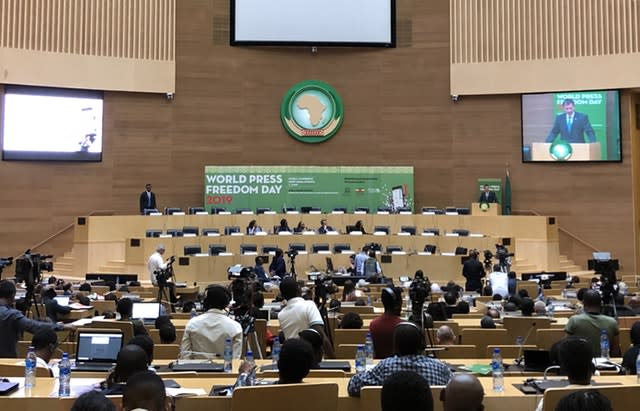Hunt condemns Russian ‘weapons of disinformation’ over Salisbury attack
Russia used “weapons of disinformation” to spread the Kremlin’s version of events about the Salisbury nerve agent attack last year, Jeremy Hunt has said.
The Foreign Secretary used a speech in Addis Ababa, Ethiopia, to take aim at the likes of RT – formerly Russia Today – over its broadcasting of the Russian state’s “official narrative” of the poisoning of Sergei Skripal and his daughter Yulia.
In an address to mark World Press Freedom Day, Mr Hunt championed the benefits of media freedom and warned that the authoritarian model of development is “ultimately flawed”.

He told a conference at the African Union HQ on Thursday morning that stopping journalists from reporting a problem “does not make it go away”, and said closing newspapers and suppressing the media is likely to store up trouble for the future.
Mr Hunt, who recently launched a global campaign to protect journalists with human rights lawyer Amal Clooney as a special envoy, said he wants to “shine a spotlight” on abuses and “raise the price” for those who would murder, arrest or detain journalists for doing their jobs.
“At the same time, we shouldn’t forget the international context. Channels like RT – better known as Russia Today – want their viewers to believe that truth is relative and the facts will always fit the Kremlin’s official narrative. Even when that narrative keeps changing.
“After the Russian state carried out a chemical attack in the British city of Salisbury last year, the Kremlin came up with over 40 separate narratives to explain that incident. Their weapons of disinformation tried to broadcast those narratives to the world.
“The best defence against those who deliberately sow lies are independent, trusted news outlets.”
Mr Hunt announced a £15.5 million support package for the Ethiopian elections in 2020 to help the National Election Board run a free and fair contest.
And he invited applications for a new Chevening Africa Media Freedom Fellowship to enable 60 African journalists over the next five years to gain experience in Britain’s newsrooms.
Ethiopia has climbed the World Press Freedom Index by 40 places – faster than any other country – after prime minister Abiy Ahmed took over last year.
Ninety-nine journalists were killed last year globally, with 348 locked up by governments, but Mr Hunt said some of the “brightest spots” for press freedom are in Africa, including Gambia and Namibia.
“Whether it is the editors who bring out independent newspapers against the odds, the journalists who brave the threats and intimidation, or the bloggers who keep a vigilant eye on their leaders: all know better than anyone else that a lively and free media provides the best possible safeguard against corruption and misrule,” he told the conference.
“Today, my argument is simple: media freedom is not a ‘Western’ value, still less a colonial-style imposition, but instead a force for progress from which everyone benefits.”
Ahead of the speech, Mr Hunt – who is on a week-long trip to Africa which has already seen him visit Ghana, Senegal and Nigeria – told reporters: “Russia over the last decade very disappointingly seem to have embarked on a foreign policy where their principal aim is to sow confusion and division and destabilise our democracies.
“They particularly seem to like to do this by manipulative media, fake news, and I’m afraid Russia Today is part of that effort. And hilarious though it was when we had the interview with the Salisbury suspects, there is actually a much darker purpose behind all of this.”
Mr Hunt declined to say whether RT should be closed down, saying it was a matter for regulator Ofcom.

 Yahoo News
Yahoo News 
